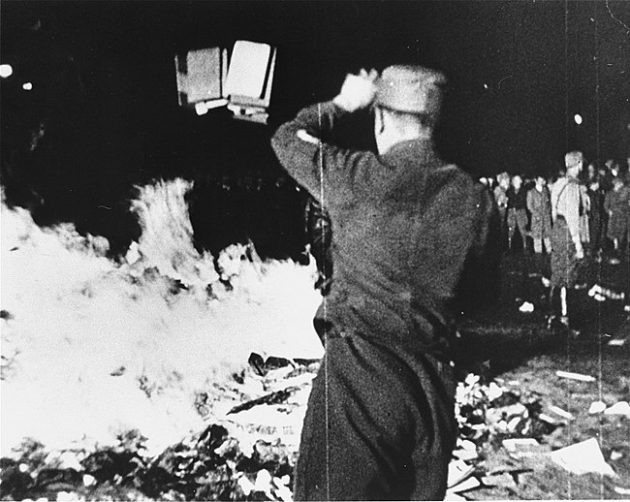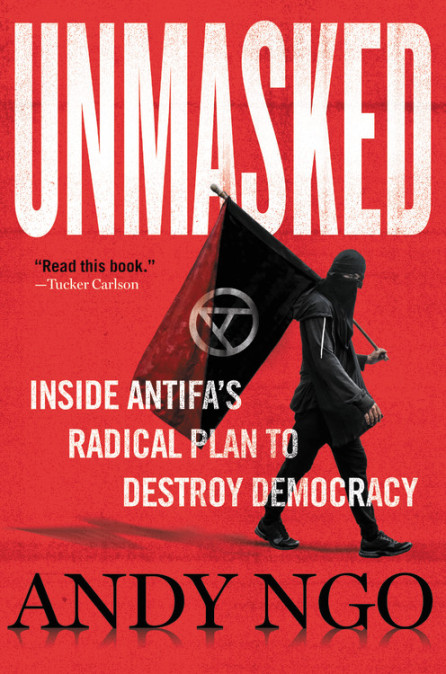Brad Polumbo
fee.org
Brad Polumbo is a libertarian-conservative journalist and Opinion Editor at the Foundation for Economic Education.
For three days and counting, protesters in Portland, Oregon have gathered at a local bookstore to demand that it stop selling a new book critical of Antifa.
“Far-left activists surrounded Powell’s Books in Portland on Monday and demanded the store stop selling Unmasked: Inside Antifa’s Radical Plan to Destroy Democracy, a book about Antifa written by Andy Ngo,” Reason’s Robby Soave reports. “The protests forced the store to close early.”
There are few acts of censorship as overt as a mob deciding which books people should be allowed to read. Ladies and gentlemen, antifa. https://t.co/pNdQKIw7SY
— Robby Soave (@robbysoave) January 12, 2021
Ngo, the editor-at-large of The Post Millennial, a Canadian conservative news site, has documented the activities of Antifa, a leftist group that advocates violence in the name of fighting fascism. The journalist was beaten by Antifa activists at a rally in 2019, leaving him with a serious brain injury.
Left-wing activists say that because Ngo documents and criticizes the activities of Antifa, which claims to simply be “anti-fascist,” he is therefore a fascist. Saying his work is too dangerous to be allowed to be aired, Antifa members have called for Ngo to be banned from social media. Now they are trying to get his book banned from bookstores.
“We have to show up every day until they stop selling that f—king book,” one activist said. She claimed it was like “stopping the historical publication of Hitler’s ‘Mein Kampf.'”
“STOP SELLING ANDY NGO’S BOOK”
— Andy Ngô (@MrAndyNgo) January 11, 2021
“HELL NO, WE WON’T NGO”
A crowd of #antifa have gathered outside @Powells bookstore in downtown Portland to demand they pull my book from their website. The store has already announced it won’t stock the book on shelves. pic.twitter.com/bsX5HMGDSW
“We have to show up every day until they stop selling that f—king book”
— Andy Ngô (@MrAndyNgo) January 11, 2021
An #antifa protester outside @Powells Books explains that stopping the release of my upcoming book would be like stopping the historical publication of Hitler’s “Mein Kampf.” pic.twitter.com/8NVTtQwYNz
“Andy Ngo, this is my personal mission to f—king destroy your career.”
— Andy Ngô (@MrAndyNgo) January 11, 2021
Portland antifa militant, Dustin Ferreira (@2lesslegs), has released a series of videos laying out threats to get my book on #antifa banned. He’s been angry I publicized his riot arrest info last year. pic.twitter.com/A6AQBAprRH
So far, the bookstore has not fully submitted to the protesters’ demands.
“This book will not be on our store shelves, and we will not promote it,” the store announced. “That said, it will remain in our online catalogue. We carry books that we find anywhere from simply distasteful or badly written, to execrable, as well as those that we treasure. We believe it is the work of bookselling to do so.”
“There are books in our stores and online inventory that contain ideas that run counter to our company’s and our employees’ values of safety, equality, and justice,” the explanation continued. “While we understand that our decision to carry such books upsets some customers and staff members, we do not want to create an echo chamber of preapproved voices and ideas. It is not our mission or inclination to decide to whom our customers should listen.”
The protests against the book have only generated more media buzz and attention to it, inadvertently—and rather ironically—helping it sell more copies.
Of course, the impulse to censor is understandable. We all think we know what is truly right, and we all believe that we’re the good guys. But the mob’s decision to engage in the modern-day equivalent of book-burning is nonetheless worth questioning.
In the novel Fahrenheit 451, author Ray Bradbury depicted a world in which firemen do not put out fires; they ignite them. In Bradbury’s dystopian world, books have been outlawed, and it is the fire department’s job to go around burning them, with the eventual goal of eliminating books entirely from society. That way, the authorities reason, they can control peoples’ access to information. And by controlling what information people may access, they can control public opinion.
“You can’t build a house without nails and wood,” one character explains. “If you don’t want a house built, hide the nails and wood.”
“If you don’t want a man unhappy politically, don’t give him two sides to a question to worry him; give him one,” the same character later says in defense of the society’s book-burning efforts. “Better yet, give him none. Let him forget there is such a thing as war. If the government is inefficient, top-heavy, and tax-mad, better it be all those than that people worry over it.”
“Now do you see why books are hated and feared?” another one of Bradbury’s characters asks. “They show the pores in the face of life. The comfortable people want only wax moon faces, poreless, hairless, expressionless.”
How does Bradbury’s message relate to Antifa’s book-banning campaign? Members of Antifa don’t generally come across as particularly “comfortable.” Yet tyrannical impulses can be found in insurgencies as well as in “the establishment.”
Like Bradbury’s “firemen,” Antifa is trying to limit the sharing of ideas in order to avoid criticism and prevent social outcomes they dislike. Rather than grapple with the criticisms Ngo makes of Antifa on their merits, they resort to deplatforming. They don’t seek to engage but to erase.
Of course, maybe critics are right that Ngo’s arguments about Antifa are weak or his facts are wrong. I don’t have any reason to believe so, but then again, I have yet to read the book.
However, we won’t ever get to the bottom of this debate by silencing one side of it. Indeed, the very fact that one side seeks to ban its opponents’ arguments suggests that, like the oppressors in Bradbury’s fictional society, they fear that their stance wouldn’t hold up to full public scrutiny.
Of course, history’s most infamous book burners were the Nazis, who also sought to “win the debate” through censorship. Antifa’s “anti-fascist” credentials are not helped by adopting typically fascist tactics.

Silencing speech cripples the contest of ideas that leads a free society toward truth over time. So censorship is worth fighting against, no matter how large the mob outside the bookstore grows.
This article was originally published on FEE.org. Read the original article.
Please share this article so that others can discover The BFD.


